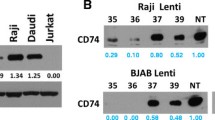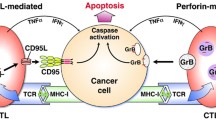Abstract
The cell surface Fas antigen transducts an apoptotic signal by its crosslinking with Fas ligand or anti-Fas antibody in a variety of human cultured cells. In this study, we examined the expression of Fas antigen and its mediation of apoptosis in six human colorectal carcinoma cell lines. A flow cytometric analysis revealed that LoVo, DLD-1, WiDr and SW837 cell lines showed higher expression levels of Fas antigen, in contrast to lower expression in COLO201 and COLO320DM. Interferon-γ enhanced the expression of Fas antigen in all of the cell lines examined. Both Fas ligand and Fas-associated phosphatase-1 (FAP-1) were expressed only in COLO320DM. Anti-Fas antibody induced apoptosis in LoVo carrying wild-type p53 gene, but not in the other five cell lines carrying mutated p53 gene. The transfection of wild-type p53 gene using an adenovirous vector upregulated P53 protein in WiDr and SW837 cells, both of which showed, however, no increase in apoptotic cells by anti-Fas antibody treatment. These results indicated that (1) Fas antigen was variably expressed, regardless of the p53 gene status and (2) the susceptibility to anti-Fas antibody-mediated apoptosis did not correlate to Fas, Fas ligand or FAP-1 expression levels. Therefore, we conclude that wild-type P53 expression might not necessarily be essential for Fas-mediated apoptosis in human colorectal carcinoma cell lines.
Similar content being viewed by others
References
Yonehara S, Ishii A, Yonehara M. A cell-killing monoclonal antibody (anti-Fas) to a cell surface antigen co-downregulated with the receptor of tumor necrosis factor. J Exp Med 1989; 169: 1747–1756.
Watanabe-Fukunaga R, Brannan CI, Itoh N, et al. The cDNA structure, expression, and chromosomal assignment of the mouse Fas antigen. J Immunol 1992; 148: 1274–1279.
Itoh N, Yonehara S, Ishii A, et al. The polypeptide encoded by the cDNA for human cell surface antigen Fas can mediate apoptosis. Cell 1991; 66: 233–243.
Nagata S, Golstein P. The Fas death factor. Science 1995; 267: 1449–1456.
Owen-Schaub LB, Yonehara S, Crump-III WL, et al. DNA fragmentation and cell death is selectively triggered in activated human lymphocytes by Fas antigen engagement. Cell Immunol 1992; 140: 197–205.
Miyawaki T, Uehara T, Nibu R, et al. Differential expression of apoptosis-related Fas antigen on lymphocyte subpopulations in human peripheral blood. J Immunol 1992; 149: 3753– 3758.
Martin L, Mina Y, Barbara AG. Fas/Fas ligand interaction contributes to UV-induced apoptosis in human keratinocytes. Exp Cell Res 1997; 232: 255–262.
Sato T, Irie S, Kitaba S, et al. FAP-1: a protein tyrosine phosphatase that associates with Fas. Science 1995; 268: 411– 415.
Yanagisawa J, Takahashi M, Kanki H, et al. The molecular interaction of Fas and FAP-1. J Biol Chem 1997; 272: 8539– 8545.
Yang E, Zha J, Jockel J, et al. Bad, a heterodimeric partner for Bcl-x and Bcl-2, displace Bax and promotes cell death. Cell 1995; 80: 285–291.
Mori S, Murakami K, Jewett A, et al. Resistance of AIDS-associated Kaposi's sarcoma cells to Fas-mediated apoptosis. Cancer Res 1996; 56: 1874–1879.
Yonish-Rouach E, Resnitzky D, Lotem J, et al. Wild-type p53 induces apoptosis of myeloid leukaemic cells that is inhibited by Interleukin-6. Nature 1991; 352: 345–347.
Shaw P, Bovey R, Tardy S, et al. Induction of apoptosis by wildtype p53 in a human colon tumour-derived cell line. Proc Natl Acad Sci USA 1992; 89: 4495–4499.
Ramqvist T, Magnusson KP, Wang Y, et al. Wild-type p53 induces apoptosis in a Burkitt lymphoma (BL) line that carries mutant p53. Oncogene 1993; 8: 1495–1500.
Fritsche M, Haessler C, Bradner G. Induction of nuclear accumulation of the tumor-suppressor protein p53 by DNA-damaging agents. Oncogene 1993; 8: 307–318.
Owen-Schaub LB, Zhang W, Cusack JC, et al. Wild-type human p53 and a temperature-sensitive mutant induce Fas/APO-1 expression. Mol Cell Biol 1995; 15: 3032–3040.
Toni US, Laurie AQ, Linda KW, et al. tumour and lymphoid cell lines from a patient with carcinoma of the colon for a cytotoxicity model. Cancer Res 1978; 38: 1345–1355.
Laurie AQ, George EM, Robert TM, et al. Cell lines from human colon carcinoma with unusual cell products, double minutes, and homogeneously staining regions. Cancer Res 1979; 39: 4914–4924.
Drewinko B, Romsdahl MM, Yang LY, et al. Establishment of a human carcinoembryonic antigen-producing colon adenocarcinoma cell line. Cancer Res 1976; 36: 467–475.
Dexter DL, Barbosa JA, Calabresi P. N,N-dimethylformamideinduced alteration of cell culture characteristics and loss of tumourigenicity in cultured human colon carcinoma cells. Cancer Res 1979; 39: 1020–1025.
Noguchi P, Wallace R, Johnson J, et al. Characterization of WiDr: a human colon carcinoma cell line. In Vitro 1979; 15: 401–408.
Leibovits A, Stinson JC, Mccombs-III WB, et al. Classification of human colorectal adenocarcinoma cell lines. Cancer Res 1976; 36: 4562–4569.
Pocard M, Chevillard S, Villaudt J, et al. Different p53 mutations produce distinct effects on the ability of colon carcinoma cells to become blocked at the G1/S boundry after irradiation. Oncogene 1996; 12: 875–882.
Chomczynski P, Sacchi N. Single-step method of RNA isolation by acid guanidinium thiocyanate-phenol-chloroform extraction. Anal Biochem 1987; 162: 156–159.
Toh Y, Yamana H, Shichijo S, et al. Expression of MAGE-1 gene by esophageal carcinomas. Jap J Cancer Res 1995; 86: 714–717.
Kanamori Y, Kigawa J, Minagawa Y, et al. A newly developed adenovirus-mediated transfer of a wild-type p53 gene increases sensitivity to cis-diamminedichloroplatium (II) in p53-deleted ovarian cancer cells. Euro J Cancer 1998; 34: 1802–1806.
Hayashi H, Tatebe S, Osaki M, et al. Expression of Fas antigen and its mediation of apoptosis in human gastric cancer cell lines. Jap J Cancer Res 1997; 88: 49–55.
Henkart PA. Lymphocyte-mediated cytotoxicity: two pathways and multiple effector molecules. Immunity 1994; 1: 343– 346.
Berhke G. The CTL's kiss of death. Cell 1995; 81: 9–12.
Lynch DH, Ramsdell F, Alderson MR. Fas and FasL in the homeostatic regulation of immune responses. Immunol Today 1995; 16: 569–574.
Alderson MR, Tough TW, Davis-Smith T, et al. Fas ligand mediates activation-induced cell death in human T lymphocytes. J Exp Med 1995; 181: 71–77.
Shiraki K, Tsuji N, Shioda T, et al. Expression of Fas ligand in liver metastasis of human colonic adenocarcinomas. Proc Natl Acad Sci USA 1997; 94: 6420–6425.
Armstrong RC, Aja T, Xiang J, et al. Fas-induced activation of the cell death-related protease CPP32 is inhibited by Bcl-2 and by ICE family protease inhibitors. J Biol Chem 1996; 271: 16850–16855.
Tamura T, Aoyama N, Saya H, et al. Induction of Fas-mediated apoptosis in p53-transfected human colon carcinoma cells. Oncogene 1995; 11: 1939–1946.
Author information
Authors and Affiliations
Rights and permissions
About this article
Cite this article
Hayashi, H., Tatebe, S., Osaki, M. et al. Anti-Fas antibody-induced apoptosis in human colorectal carcinoma cell lines: role of the p53 gene. Apoptosis 3, 431–437 (1998). https://doi.org/10.1023/A:1009662619907
Issue Date:
DOI: https://doi.org/10.1023/A:1009662619907




